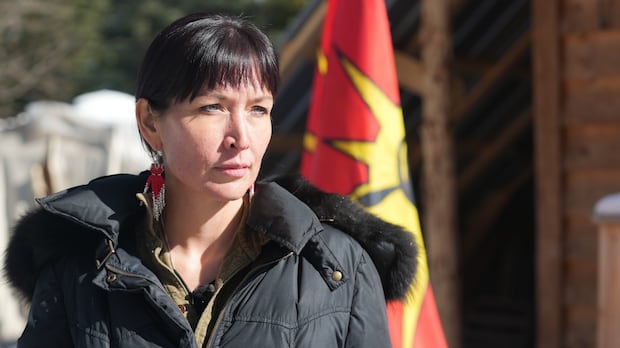A Wet’suwet’en leader and two other pipeline opponents have been given suspended jail sentences and community service for breaking an injunction against blocking work on the Coastal GasLink pipeline.
“Historically, this type of suspended sentence was akin to a form of judicial clemency,” said B.C. Supreme Court Justice Michael Tammen on Friday.
“In this case, it is appropriate to extend such judicial clemency, in part based on the need to foster reconciliation with Indigenous Peoples.”
Sleydo’, also known as Molly Wickham, a wing chief of Cas Yikh, a house group of the Gidimt’en Clan of the Wet’suwet’en Nation, Shaylynn Sampson, a Gitxsan woman with Wet’suwet’en family ties, and Corey Jocko, who is Kanien’kehá:ka from Akwesasne, were found guilty of criminal contempt in January 2024.
They were arrested in November 2021 at a blockade on Wet’suwet’en traditional territory for breaking a 2019 injunction against people blocking work on the Coastal GasLink pipeline.
Tammen gave Sleydo’ a net sentence of 17 days, Jocko received a net sentence of 12 days and Sampson was given a net sentence of 9 days.
But their terms are suspended, and jail time will only be served if there are further breaches of the injunction or recognizance conditions in the next year. Each must complete 150 hours of community service.
Crown sought jail time; defence wanted time served
The Crown sought jail time for the accused, saying it was needed to preserve the rule of law and deter both those convicted and the wider public “from similar actions.”
Crown lawyer Paul Battin argued custodial sentences were warranted due to social media posts that called for others to join the blockade after the injunction was imposed, the risk to CGL workers who were unable to leave the blockade area for four days and the risk to RCMP enforcing the injunction.
“This sentencing is about how these three contemners acted. On how those views, and how those actions, undermine the court’s reputation and the rule of law,” said Battin Wednesday.
But defence lawyer Frances Mahon argued more jail time would further degrade the integrity of the court following an abuse of process ruling, and said Thursday that time served would be a more appropriate sentence.
In February, Sleydo’, Jocko and Sampson brought forward the abuse of process application that alleged RCMP used excessive force during their arrests.
 RCMP officers are seen outside a warming centre on Wet’suwet’en territory on Feb. 8, 2020. (Chantelle Bellrichard/CBC)
RCMP officers are seen outside a warming centre on Wet’suwet’en territory on Feb. 8, 2020. (Chantelle Bellrichard/CBC)
Justice Tammen found some of their Charter rights — to life, liberty, and security of person — were breached during arrest, and also referenced recordings where several police officers on two separate occasions compared Sleydo’ and Sampson, who wore a red handprint painted on their faces, to orcs in the movie The Lord of the Rings.
“I found those comments to be grossly offensive, racist and dehumanizing,” said Tammen during his decision Friday.
Tammen said he also took into account the extensive time the three spent in RCMP transport vehicles, calling Sleydo’, Jock and Sampson’s experience “harsh” and “arduous.”
Court heard the three spent hours from Nov. 19 to Nov. 22 without washroom breaks at various times during their transport, and sometimes up to 11 hours without a meal.
‘We’re talking about this specific history’
Battin also said the beliefs of Sleydo’, Jocko and Sampson did not justify their choice to defy a court order, and referenced prior Court of Appeal decisions where the beliefs of an Indigenous person convicted of criminal contempt were not factored into sentencing.
But Mahon said history must be taken to account, referencing the 1997 Delgamuukw decision and a memorandum of understanding (MOU) signed in 2020 between Wet’suwet’en hereditary chiefs and the federal and provincial governments, arguing neither have been implemented in a meaningful way.
“We’re not talking about beliefs here,” Mahon said.
“We’re talking about this specific history, which has, in essence, constrained the circumstances of the Wet’suwet’en to prove its title beyond the recognition that the provincial and federal governments have not extinguished it.”
“This is an integral component of why they have come before the courts,” Mahon said.
Tammen said he agreed with the defence that the failure to meaningfully implement the MOU was part of what led to the “offending behaviour” that brought the three to court.
“I do consider it as an extremely unique circumstance, which should be considered,” said Tammen.
“I am also mindful of the fact that the dark shadow of the legacy of colonization looms large in the broader backdrop to this case.”
The Crown sought a sentence of 30 days for Sleydo’, 25 days for Jocko and 20 days for Sampson, with reductions for time served, and the two to five-day credit proposed as a remedy as a result of the abuse of process ruling.
Tammen granted a reduction with credit, resulting in a ten day deduction for Slaydo and Jocko, and an eight day deduction for Sampson. As a remedy for the abuse of process ruling, Tammen granted three days.
The defence sought a sentence of time served or a conditional sentence order with 100 to 150 hours of community service to respond to the continued overincarceration of Indigenous people.
Tammen said he largely agreed with the Crown’s submission and determined sentences of 30 days for Sleydo’, 25 for Jocko and 20 days for Sampson before credits, but chose to suspend the implementation of the remaining jail sentences in hopes to “foster respect for the common law courts of Canada.”
“If by suspending the implementation of the remaining jail sentence in this case, I can advance the goal of reconciliation with Indigenous Peoples, even infinitesimally, I should seriously consider it,” said Tammen.
“In my view, right thinking members of society would not view the sentence I have imposed as unduly lenient, nor in my view does this sentence risk erosion of respect for the courts or the rule of law.”
The blockade delayed, but did not stop, the completion of the 670-kilometre pipeline, which carries natural gas across northern British Columbia to a terminal in Kitimat for export to Asia. LNG Canada exported its first shipment in June.
Sleydo’ said at the end of sentencing arguments Thursday that Wet’suwet’en land “has never been ceded or surrendered.”
“We are more than just our songs and dances. Our ancestors said we are the land, and the land is us. Our laws flow from the land, we are nothing without it.”

